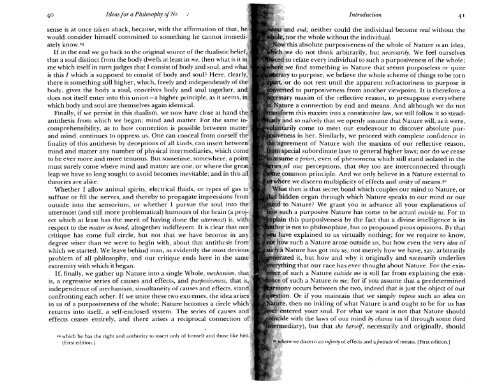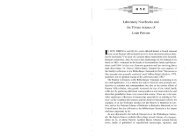Ideas for a Philosophy of Nature
Ideas for a Philosophy of Nature
Ideas for a Philosophy of Nature
Create successful ePaper yourself
Turn your PDF publications into a flip-book with our unique Google optimized e-Paper software.
4 0<strong>Ideas</strong> <strong>for</strong> a <strong>Philosophy</strong> <strong>of</strong>NcIntroduction4 1sense is at once taken aback, because, with the affirmation <strong>of</strong> that, hwould consider himself committed to something he cannot immediately know.wIf in the end we go back to the original source <strong>of</strong> the dualistic beliethat a soul distinct from the body dwells at least in me, then what is it ime which itself in turn judges that I consist <strong>of</strong> body and soul, and whais this I which is supposed to consist <strong>of</strong> body and soul? Here, clearlythere is something still higher, which, freely and independently <strong>of</strong> thbody, gives the body a soul, conceives body and soul together, andoes not itself enter into this union -a higher principle, as it seems, iwhich body and soul are themselves again identical.Finally, if we persist in this dualism, we now have close at hand thantithesis from which we began: mind and matter. For the same incomprehensibility, as to how connection is possible between matteand mind, continues to oppress us. One can conceal from oneself thfinality <strong>of</strong> this antithesis by deceptions <strong>of</strong> all kinds, can insert betweemind and matter any number <strong>of</strong> physical intermediaries, which comto be ever more and more tenuous. But sometime, somewhere, a poinmust surely come where mind and matter are one, or where the grealeap we have so long sought to avoid becomes inevitable; and in this altheories are alike.Whether I allow animal spirits, electrical fluids, or types <strong>of</strong> gas tsuffuse or fill the nerves, and thereby to propagate impressions fromoutside into the sensorium, or whether I pursue the soul into thuttermost (and still more problematical) humours <strong>of</strong> the brain (a project which at least has the merit <strong>of</strong> having done the uttermost) is, witrespect to the matter in hand, altogether indifferent. It is clear that oucritique has come full circle, but not that we have become in andegree wiser than we were to begin with, about that antithesis frowhich we started. We leave behind man, as evidently the most deviouproblem <strong>of</strong> all philosophy, and our critique ends here in the samextremity with which it began.If, finally, we gather up <strong>Nature</strong> into a single Whole, mechanism, thais, a regressive series <strong>of</strong> causes and effects, and purposiveness, that isindependence <strong>of</strong> mechanism, simultaneity <strong>of</strong>causes and effects, stanconfronting each other. If we unite these two extremes, the idea arisein us <strong>of</strong> a purposiveness <strong>of</strong> the whole; <strong>Nature</strong> becomes a circle whicreturns into itself, a self-enclosed system. The series <strong>of</strong> causes aneffects ceases entirely, and there arises a reciprocal connection 0'9 which he has the right and authority to assert only <strong>of</strong> himself and those like him.[First edition.]d end; neither could the individual become real without theor the whole without the individual.his absolute purposiveness <strong>of</strong> the whole <strong>of</strong> <strong>Nature</strong> is an Idea,e do not think arbitrarily, but necessarily. We feel ourselvesrelate every individual to such a purposiveness <strong>of</strong> the whole;e find something in <strong>Nature</strong> that seems purposeless or quiteto purpose, we believe the whole scheme <strong>of</strong> things to be tornI' do not rest until the apparent refractoriness to purpose isd to purposiveness from another viewpoint. It is there<strong>for</strong>e ay maxim <strong>of</strong> the reflective reason, to presuppose everywherere a connection by end and means. And although we do notm this maxim into a constitutive law, we still follow it so steadsonaively that we openly assume that <strong>Nature</strong> will, as it were,ily come to meet our endeavour to discover absolute purssin her. Similarly, we proceed with complete confidence inement <strong>of</strong> <strong>Nature</strong> with the maxims <strong>of</strong> our reflective reason,ecial subordinate laws to general higher laws; nor do we ceasee a priori, even <strong>of</strong> phenomena which still stand isolated in thef our perceptions, that they too are interconnected throughmmon principle. And we only believe in a <strong>Nature</strong> external towe discern multiplicity <strong>of</strong>effects and unity <strong>of</strong> means.sthenis that secret bond which couples our mind to <strong>Nature</strong>, orden organ through which <strong>Nature</strong> speaks to our mind or our<strong>Nature</strong>? We grant you in advance all your explanations <strong>of</strong>h a purposive <strong>Nature</strong> has come to be actual outside us. For tothis purposiveness by the fact that a divine intelligence is itsis not to philosophize, but to propound pious opinions. By thatve explained to us virtually nothing; <strong>for</strong> we require to know,such a <strong>Nature</strong> arose outside us, but how even the very idea <strong>of</strong><strong>Nature</strong> has got into us; not merely how we have, say, arbitrarilyted it, but how and why it originally and necessarily underliesg that our race has ever thought about <strong>Nature</strong>. For the exisfsuch a <strong>Nature</strong> outside me is still far from explaining the exisfsuch a <strong>Nature</strong> in me; <strong>for</strong> if you assume that a predeterminedy occurs between the two, indeed that is just the object <strong>of</strong> our. Or if you maintain that we simply impose such an idea onthen no inkling <strong>of</strong> what <strong>Nature</strong> is and ought to be <strong>for</strong> us hasered your soul. For what we want is not that <strong>Nature</strong> shouldwith the laws <strong>of</strong> our mind by chance (as if through some thirdediary), but that she herself, necessarily and originally, shouldere we discern an infinity <strong>of</strong>effects and afinitude <strong>of</strong> means. [First edition.]



